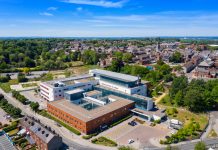The work of the Japanese Cancer Association in driving forward cancer research through collaboration is charted here, including a push on basic and translational research
For over 70 years, the Japanese Cancer Association has supported research into all forms of the disease based on national and international collaboration between scholars.
The Japanese Cancer Association traces its roots back to the Japanese Foundation for Cancer Research, which held its first Scientific Convention in April 1908.
In 1935, the foundation resolved to establish a new, independent body that could capitalise on the rapid advances being made in cancer research and play a central role in promoting further study.
Following the decision by the society’s board of directors to establish the Japanese Cancer Association in March 1940, President Mataro Nagayo told the 32nd Japanese Foundation for Research Scientific Convention at Tokyo Imperial University: “In consideration of the developments of recent years, I believe it is appropriate to newly establish the Japanese Cancer Association and hold meetings under that name.
“We think that by doing this cancer research in this country, [it] will be pushed further ahead by the united cooperation of scholars nationwide.”
The JCA’s first scientific lecture meeting was held at Osaka Imperial University on 5 April 1941.
Since then, the association has grown to comprise over 15,000 members specialising in a wide range of basic and clinical cancer research, as well as research on public health and social medicine, who exchange information.
The association’s Annual Meeting is held every autumn and approximately 5,000 research and students, members of research advocators and various other stakeholders take part.
The JCA is actively promoting the globalisation of its work and since 2007, the Annual Meeting now includes an International Session featuring speakers from abroad, particularly neighbouring Asian countries.
In addition, since 1989, the JCA has held a joint conference every three years with the American Association for Cancer Research in the Hawaiian Islands. The last event, in 2016, was held under the title Breakthroughs in Cancer Research: From Biology to Therapeutics and was attended by around 570 participants from Japan, the U.S. and other countries.
Cancer research itself has, of course, made great strides over the years and has clarified the nature of cancer biology. Remarkable progress has been made in treatment of the disease, particularly in the area of molecular target therapy based on the genomic abnormalities of individual cancers. Genomic medicine, a type of precision medicine, will allow medical care to be tailored to an individual based on their genomic information.
Indeed, genomic medicine was one of the key issues under discussion at the 77th Annual Meeting of the Japanese Cancer Association, which took place in Osaka in September 2018.
Under the title, Diving Deeper into Cancer Research, the meeting discussed developments and emerging challenges in genomic medicine in light of President Barack Obama’s Precision Medicine Initiative, announced in the 2015 State of the Union address, and the creation of Japan’s Council for Promoting Genomic Medicine.
Another key topic for discussion was immunotherapy, which has emerged as a fourth therapeutic method for cancer following surgery, radiation and drugs, along with how cutting-edge research in areas such as artificial intelligence and genome editing are being used in cancer research.
Innovative thinking is, of course, crucial to the continuing development and diversification of cancer research, which is why the Annual Meeting offered a number of sessions aimed specifically at young researchers.
There was also a special symposium on Advances in Basic and Clinical Medicine in the Past 10 Years, which reviewed progress in research that would have been unimaginable just a few years ago.
However, while the development of new drugs is good news for patients, there are nevertheless concerns about the high prices for these treatments and what this means for the future of Japan’s healthcare system.
With this in mind, the JCA is seeking the opinions of stakeholders, including patients, healthcare professionals, governments and related academic societies to provide recommendations for the public.
As in previous years, the three-day Annual Meeting featured International Sessions covering 12 selected topics, with discussions led by prominent researchers in each area.
As the remarkable progress in the treatment and prevention of cancer continues, the JCA remains as committed as ever to its goal of using collaboration to drive forward research.
President Hitoshi Nakagama says: “JCA will work more vigorously on basic and translational research, and develop human resources, including young researchers.
“We expect to establish and strengthen cooperative relationships with foreign researchers, so that we will contribute to the development of life sciences, promote the development of new cancer prevention and treatment methods, and contribute to society through the future promotion of cancer research.”
Open Access Government











